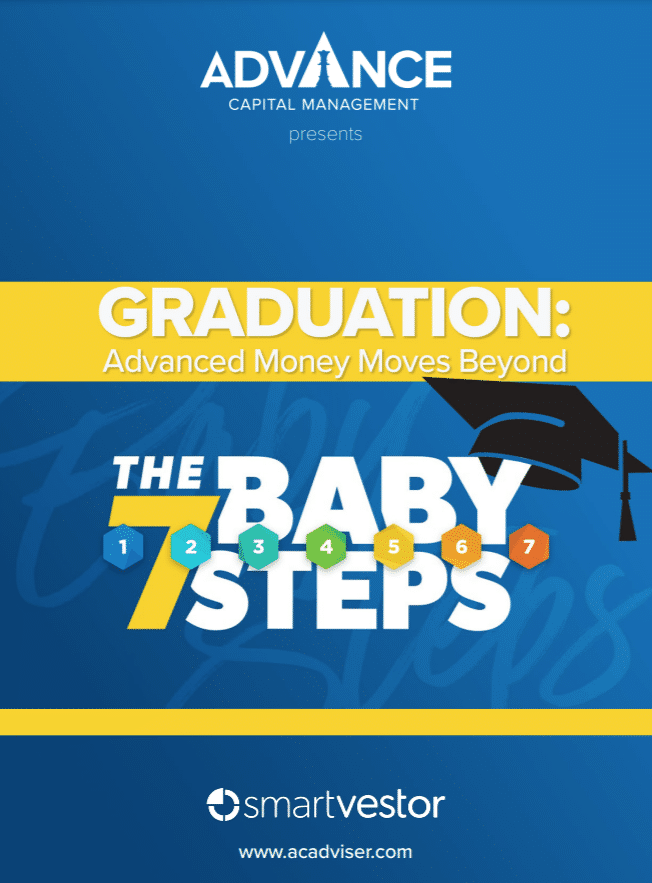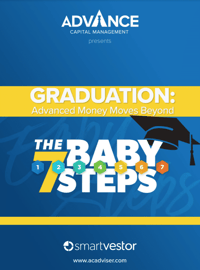What Comes After the 7 Baby Steps?
March 9th, 2022 | 2 min. read

 Anyone familiar with the work of Dave Ramsey knows his famous 7 Baby Steps. They are designed to help people save for emergencies, eliminate debt and build wealth.
Anyone familiar with the work of Dave Ramsey knows his famous 7 Baby Steps. They are designed to help people save for emergencies, eliminate debt and build wealth.
If you need a refresher, those steps are:
- Save $1,000 for your starter emergency fund.
- Pay off all debt (except the house) using the debt snowball.
- Save 3–6 months of expenses in a fully funded emergency fund.
- Invest 15% of your household income in retirement.
- Save for your children’s college fund.
- Pay off your home early.
- Build wealth and give.
But the thing is, your financial journey doesn’t end there. Once you graduate beyond the 7 Baby Steps, there are a variety of financial steps to take to successfully transition from accumulating wealth to managing wealth.
So, what comes next?
We’ve come up with some financial steps that build off the 7 Baby Steps and published them in a our free e-book: GRADUATION: Advanced Money Moves Beyond the 7 Baby Steps. They can help you efficiently manage your assets, stay debt free and prepare for retirement.
1. Maintain a Debt-Free Balance Sheet Before Retirement
If you’re nearing retirement while carrying outstanding debt, it’s okay to restart Baby Step 2 and follow the snowball method. For many soon-to-be-retirees, the main challenge is avoiding any new debt, even when you have good intentions at heart. One type of debt plaguing older adults is student loan debt, as many parents and grandparents co-sign or take out loans to help pay for a child or grandchild’s education.
2. Invest Your Excess Cash
Keeping the value of your money above the rate of inflation is a major reason for investing money. Therefore, you should consider investing your excess cash – as long as you have a fully funded emergency fund.
3. Consolidate Your Retirement Accounts
Consolidating your retirement accounts into a single individual retirement account (IRA) provides a variety of benefits, including the potential to lower your investment fees, more investment options and direct professional help.
4. Use Your Children’s College Fund Effectively for Financial Aid
If not careful, families helping a student pay for college may learn a new meaning behind the phrase “no good deed goes unpunished.” That’s because common college savings vehicles, from 529 accounts to trust funds, that are not set up properly can adversely impact the amount of financial aid a student receives.
5. Using Your Home for Retirement Income
For many retirees, home equity – the amount of the home you own – is their largest store of wealth. And, a common way turn your home into retirement income is to simply move to a less expensive one, known as downsizing.
6. Give Efficiently
One of the best uses of your wealth is to help others. But as a donor, when and what you give has various tax implications. Therefore, it is important to ensure your charitable goals are successfully implemented into your current and future financial life.
If you would like to learn more about these advanced financial steps, download your free copy of GRADUATION: Advanced Money Moves Beyond the 7 Baby Steps. It’s an easy read packed full of information that’s appropriate for where you are in your financial journey.
Advance Capital Management is a fee-only RIA serving clients across the country. The Advance Capital Team includes financial advisers, investment managers, client service professionals and more -- all dedicated to helping people pursue their financial goals.

